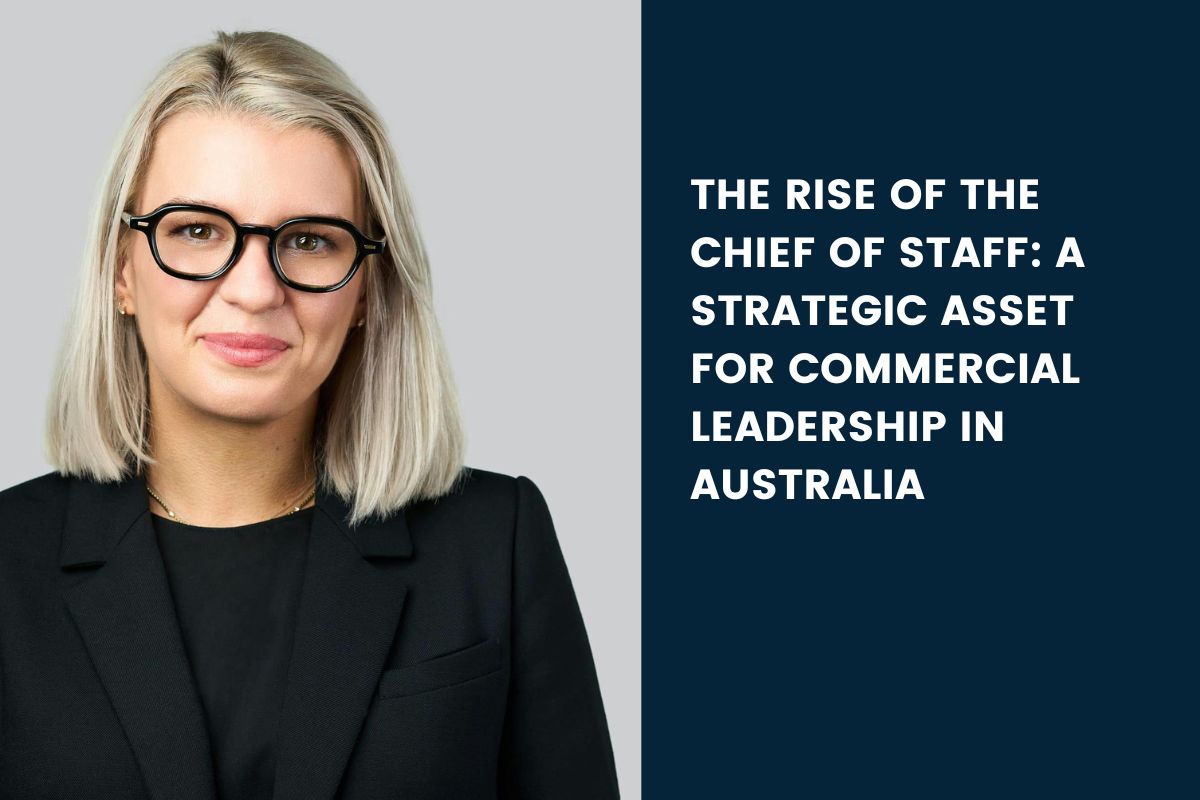Why the Chief of Staff Role is Gaining Traction in Australian Industry
The transition of the Chief of Staff role into the commercial sector reflects a growing need for senior leaders to have trusted partners who can bridge the gap between strategy and execution. As organisations navigate rapid market shifts, digital transformation, and internal change management, the Chief of Staff provides the essential link between executive priorities and day-to-day operations.
In high-performing organisations, the Chief of Staff acts as a strategic advisor, integrator, and change agent. This enables CEOs and C-suite leaders to focus on vision and growth, while ensuring that strategic priorities are executed efficiently across teams. Such alignment is crucial for businesses undergoing transformation or scaling operations—a common scenario among Galvin-Rowley Executive’s clients.
Key Benefits of a Chief of Staff in Commercial Environments
The value of a Chief of Staff extends well beyond traditional support functions. Here are the core benefits that this role brings to commercial organisations:
1. Strategic Alignment and Execution
A Chief of Staff enhances the alignment between vision and delivery. By translating strategic goals into actionable plans and monitoring progress, they act as a multiplier for the executive team’s effectiveness. This ensures that the organisation’s objectives are not only set but also achieved.
2. Leadership Leverage
CEOs and business leaders often face cognitive overload due to the sheer volume of information and decisions required. A skilled Chief of Staff filters, prioritises, and manages information, ensuring that leaders spend their time where it adds the most value. This results in:
- Improved decision-making
- Reduced organisational drag
- Enhanced executive focus
3. Organisational Agility
During periods of change—such as mergers, restructuring, or rapid growth—the Chief of Staff is pivotal in maintaining continuity and coherence. Their ability to manage cross-functional initiatives ensures that momentum is sustained, even during disruption. This agility is essential for organisations aiming to remain competitive in dynamic markets.
4. Culture and Communication Champion
Cultural alignment is a cornerstone of leadership success. A Chief of Staff helps maintain organisational integrity by:
- Reinforcing company culture
- Facilitating clear communication
- Ensuring internal messaging reflects the organisation’s values
This focus on culture and communication helps build trust and engagement across all levels of the business.
The Chief of Staff: Perfectly Aligned with Galvin-Rowley Executive’s Mission
Galvin-Rowley Executive understands that effective leadership is about orchestrated impact, not just individual capability. The Chief of Staff role epitomises this philosophy. As a firm renowned for bespoke, culturally aligned executive placements, Galvin-Rowley Executive is uniquely positioned to identify and secure Chief of Staff candidates who offer both strategic acumen and relational fluency.
For clients facing leadership transitions, organisational growth, or structural complexity, appointing a Chief of Staff can be a transformative step. This role can future-proof an organisation by embedding agility, coherence, and strategic discipline at the heart of the executive function.
Who Benefits Most from a Chief of Staff? Ideal Client Profiles
The Chief of Staff role is particularly valuable for organisations that are leadership-driven and growth-oriented. Galvin-Rowley Executive’s ideal clients span the private, public, government, and not-for-profit sectors, each with unique needs and aspirations.
Private Sector
Private companies, including medium and large businesses, benefit from a Chief of Staff who can:
- Drive transformation and market expansion
- Address leadership gaps during innovation
- Ensure alignment between leadership hires and organisational goals
These organisations value innovation, adaptability, and cultural alignment, seeking leaders who can deliver measurable impact and strengthen market position.
Government Organisations
Australian government agencies and public-sector bodies require Chiefs of Staff who can:
- Balance political, public, and stakeholder expectations
- Manage large-scale projects and operations
- Foster diversity, equity, and inclusion in leadership teams
These clients prioritise ethical governance, operational excellence, and public trust.
Not-for-Profit Organisations
Charities, advocacy groups, and NGOs need Chiefs of Staff who:
- Bring niche experience in mission-driven environments
- Operate within tight budgetary constraints
- Align leadership hires with organisational values and DEI goals
These organisations are committed to social impact, inclusivity, and long-term sustainability.
The Strategic Impact of a Chief of Staff: Real-World Scenarios
To illustrate the transformative power of the Chief of Staff, consider the following scenarios:
- Leadership Transitions: During CEO succession or board changes, a Chief of Staff ensures continuity and smooth handover of responsibilities.
- Rapid Growth: As organisations scale, the Chief of Staff manages cross-functional projects, keeping teams aligned and focused on strategic objectives.
- Cultural Transformation: When embedding new values or driving cultural change, the Chief of Staff acts as a communication bridge, reinforcing desired behaviours and messaging.
In each case, the Chief of Staff is not just a facilitator but a catalyst for sustainable success.
Why Choose Galvin-Rowley Executive for Chief of Staff Recruitment?
Galvin-Rowley Executive’s approach is tailored, consultative, and deeply aligned with each client’s culture and long-term goals. The firm’s expertise in executive search ensures that every Chief of Staff placement is:
- Strategically matched to the organisation’s needs
- Culturally aligned for maximum impact
- Supported by a high-touch, client-centric process
Clients benefit from Galvin-Rowley Executive’s deep market knowledge, rigorous assessment methods, and commitment to discretion and professionalism.
Future-Proofing Your Organisation with a Chief of Staff
The rise of the Chief of Staff in commercial sectors is no passing trend. It represents a maturation in how businesses view leadership and the mechanics of high performance. As organisations strive to build cohesive, forward-thinking teams, this pivotal role will become a staple of C-suite structures—a trusted force behind sustainable success.

